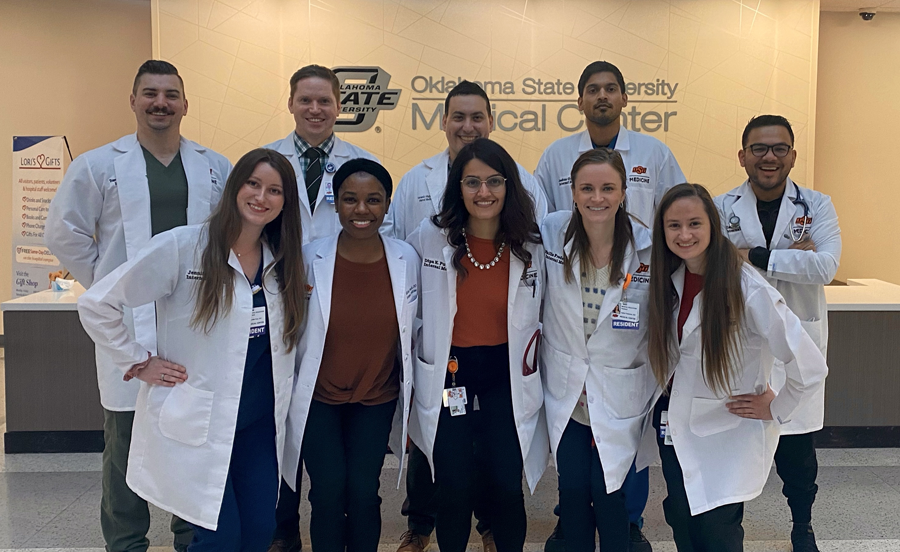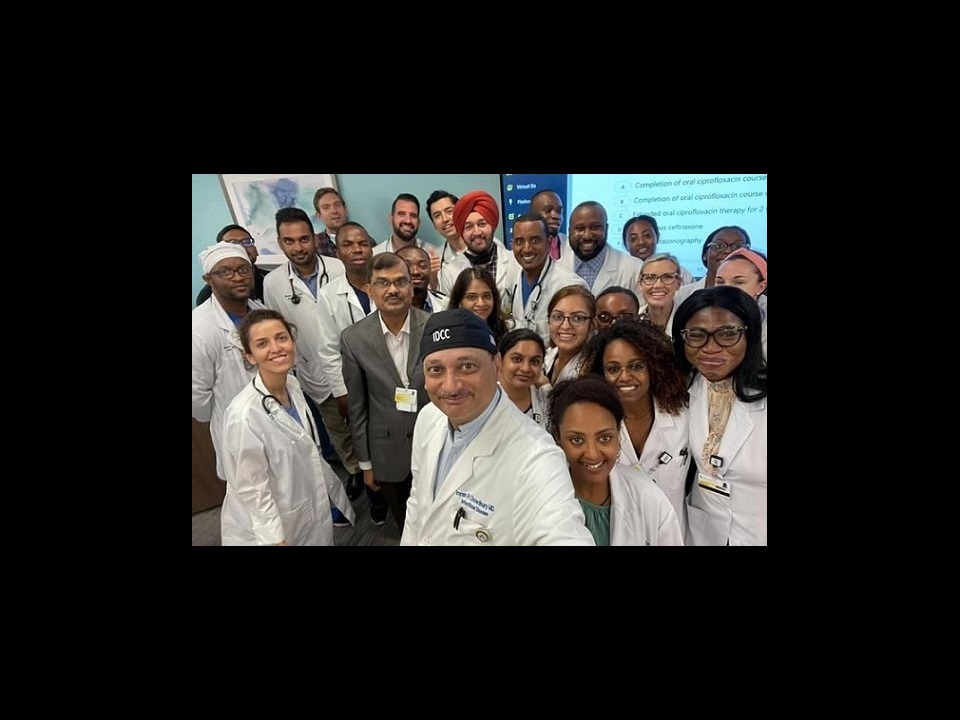Comprehensive Guide To UHS Internal Medicine Residency: Your Path To Becoming A Specialist
Choosing the right internal medicine residency program is a pivotal step for aspiring physicians. A well-structured program like the UHS Internal Medicine Residency can shape your career and provide you with the skills and knowledge necessary to excel in the field. As you embark on this journey, understanding the nuances of this program is crucial to making an informed decision.
Internal medicine residency programs offer aspiring doctors a unique opportunity to specialize in diagnosing and treating a wide range of medical conditions. Whether you're interested in cardiology, endocrinology, or infectious diseases, a solid foundation in internal medicine is essential. UHS Internal Medicine Residency stands out due to its comprehensive curriculum and hands-on experience.
In this article, we will delve into the intricacies of the UHS Internal Medicine Residency program, covering everything from its structure to the career opportunities it offers. Whether you're a medical student or a professional considering a career shift, this guide will provide you with the information you need to succeed.
Table of Contents
- Overview of UHS Internal Medicine Residency
- Eligibility Criteria
- Curriculum and Training
- Faculty and Mentorship
- Research Opportunities
- Financial Aid and Scholarships
- Location and Facilities
- Career Pathways
- Application Process
- Conclusion
Overview of UHS Internal Medicine Residency
UHS Internal Medicine Residency is a highly regarded program designed to train future internists. The program focuses on equipping residents with the skills necessary to manage complex medical conditions and provide compassionate care. With a strong emphasis on evidence-based medicine and patient-centered care, UHS Internal Medicine Residency prepares residents to excel in both clinical and academic settings.
The program spans three years, during which residents rotate through various medical specialties, gaining hands-on experience in diagnosing and treating a wide array of conditions. The curriculum is designed to ensure that residents develop a deep understanding of internal medicine principles while honing their clinical skills.
One of the standout features of the UHS Internal Medicine Residency program is its commitment to fostering a supportive learning environment. Residents receive mentorship from experienced faculty members who are leaders in their respective fields. This mentorship helps residents navigate the challenges of residency and develop into competent physicians.
Eligibility Criteria
Before applying to the UHS Internal Medicine Residency program, it's important to ensure that you meet the eligibility criteria. The program is open to medical school graduates who have completed an accredited medical education program. Additionally, applicants must hold a valid ECFMG certificate if they are international medical graduates.
Below are the key eligibility requirements:
- Completion of an accredited medical school program
- Valid ECFMG certificate (for international graduates)
- Eligibility for medical licensure in the United States
- Strong academic performance and clinical skills
Meeting these criteria increases your chances of being accepted into the program. However, the selection process is competitive, and applicants are evaluated based on their academic achievements, clinical experience, and personal qualities.
Curriculum and Training
The curriculum of the UHS Internal Medicine Residency program is meticulously designed to provide residents with a well-rounded education. Over the three years of the program, residents rotate through various core rotations and electives, ensuring they gain exposure to a wide range of medical specialties.
Core Rotations
Core rotations form the backbone of the UHS Internal Medicine Residency program. These rotations provide residents with essential clinical experience in key areas of internal medicine. Some of the core rotations include:
- General Medicine
- Cardiology
- Pulmonology
- Gastroenterology
- Endocrinology
Each rotation lasts for a specified period, allowing residents to immerse themselves in the specialty and gain in-depth knowledge. The program also emphasizes the importance of teamwork and communication, ensuring that residents develop the interpersonal skills necessary to work effectively in a multidisciplinary healthcare team.
Elective Opportunities
In addition to core rotations, residents have the opportunity to choose from a variety of electives. These electives allow residents to explore areas of interest and gain specialized knowledge. Some popular elective options include:
- Infectious Diseases
- Hematology-Oncology
- Nephrology
- Rheumatology
Electives provide residents with the flexibility to tailor their education to their career goals, ensuring they receive training that aligns with their professional aspirations.
Faculty and Mentorship
One of the strengths of the UHS Internal Medicine Residency program is its exceptional faculty. The program boasts a team of experienced physicians who are leaders in their respective fields. Faculty members are committed to providing residents with the guidance and support they need to succeed.
Mentorship plays a crucial role in the program. Each resident is assigned a faculty mentor who provides personalized guidance throughout their residency. Mentors help residents navigate the challenges of residency, offer career advice, and support their professional development.
Residents also have access to a robust network of alumni who are successful physicians in various subspecialties. This network provides valuable connections and opportunities for collaboration, further enhancing the learning experience.
Research Opportunities
Research is an integral part of the UHS Internal Medicine Residency program. Residents are encouraged to participate in research projects, allowing them to contribute to the advancement of medical knowledge. The program provides resources and support to facilitate research activities, including access to state-of-the-art laboratories and collaboration with renowned researchers.
Residents have the opportunity to present their research findings at national and international conferences, gaining exposure and recognition in the medical community. This experience not only enhances their resumes but also prepares them for potential careers in academic medicine.
Financial Aid and Scholarships
Understanding the financial aspects of residency is important for prospective applicants. The UHS Internal Medicine Residency program offers competitive stipends and benefits to ensure residents can focus on their training without undue financial stress. Additionally, residents may be eligible for scholarships and grants to support their education.
The program also provides resources to help residents manage their finances effectively, including workshops on budgeting and debt management. These resources empower residents to make informed financial decisions and plan for their future.
Location and Facilities
The UHS Internal Medicine Residency program is located in a state-of-the-art medical center that offers residents access to cutting-edge technology and facilities. The facility is equipped with advanced diagnostic tools and treatment options, ensuring that residents receive hands-on experience with the latest medical innovations.
Additionally, the program's location in a vibrant city provides residents with a rich cultural and social environment. Residents have access to a wide range of amenities, including restaurants, entertainment venues, and outdoor activities, making it an ideal place to live and work.
Career Pathways
Completing the UHS Internal Medicine Residency program opens up a multitude of career opportunities for residents. Graduates are well-prepared to pursue careers in clinical practice, academic medicine, or research. The program's comprehensive training and strong reputation make its graduates highly sought after by employers.
Some potential career paths for UHS Internal Medicine Residency graduates include:
- Private practice physician
- Hospitalist
- Academic faculty member
- Medical researcher
Regardless of their chosen path, graduates of the program are equipped with the skills and knowledge necessary to excel in their chosen field.
Application Process
Applying to the UHS Internal Medicine Residency program involves several steps. Prospective applicants must submit a complete application through the Electronic Residency Application Service (ERAS). The application process includes:
- Submission of transcripts and letters of recommendation
- Completion of the USMLE or COMLEX exams
- Participation in interviews with program faculty
It's important to start the application process early to ensure all materials are submitted by the deadline. The program values well-rounded candidates who demonstrate a commitment to excellence in both academics and clinical practice.
Conclusion
The UHS Internal Medicine Residency program offers aspiring physicians an unparalleled opportunity to excel in the field of internal medicine. With its comprehensive curriculum, experienced faculty, and state-of-the-art facilities, the program provides residents with the skills and knowledge necessary to succeed in their careers.
We encourage you to take the next step by exploring the program further and submitting your application. Don't forget to share this article with your peers and leave a comment below if you have any questions or feedback. For more information on medical education and career opportunities, be sure to check out our other articles on the website.
- Trace Of Lace In Gulfport Mississippi
- Paterson Nj Police Department
- Paw Points
- Happy African Hair Braiding
- Azurescens Mushrooms

Internal Medicine Residency Program Oklahoma State University

Internal Medicine Residency Program UM Capital Region Health